Abstract
Mongrel dogs with ascites created by inferior vena cava ligation were given cephalothin, cephaloridine, cefazolin, and cefamandole to evaluate the effect of protein binding and serum pharmacokinetics on the distribution of cephalosporins into ascitic fluid. Antibiotics were given intramuscularly (15 mg/kg) every 4 h for a total of eight doses. Antibiotic binding to dog serum and ascitic fluid was measured by ultracentrifugation. Binding of the cephalosporins to dog serum ranged from 31% for cephaloridine to 46% for cephalothin, considerably lower than human serum binding for cefazolin, cephalothin, and cefamandole. Antibiotic binding to ascitic fluid was only slightly lower than that to serum. Ascitic fluid antibiotic concentrations, which approached equilibrium at 16 to 28 h, were significantly higher for cefazolin and cephaloridine than for cephalothin and cefamandole. However, serum concentrations were also higher for cefazolin and cephaloridine, and percent penetration (ratio of serum peak to ascites peak × 100) was not statistically different among the four drugs. Binding of these cephalosporins to extravascular fluid protein was an important factor that determined the total ascitic fluid antibiotic level achieved. A formula utilizing the log mean serum level and binding to serum and extravascular fluid protein was used to accurately predict ascitic fluid drug levels at equilibrium.
Full text
PDF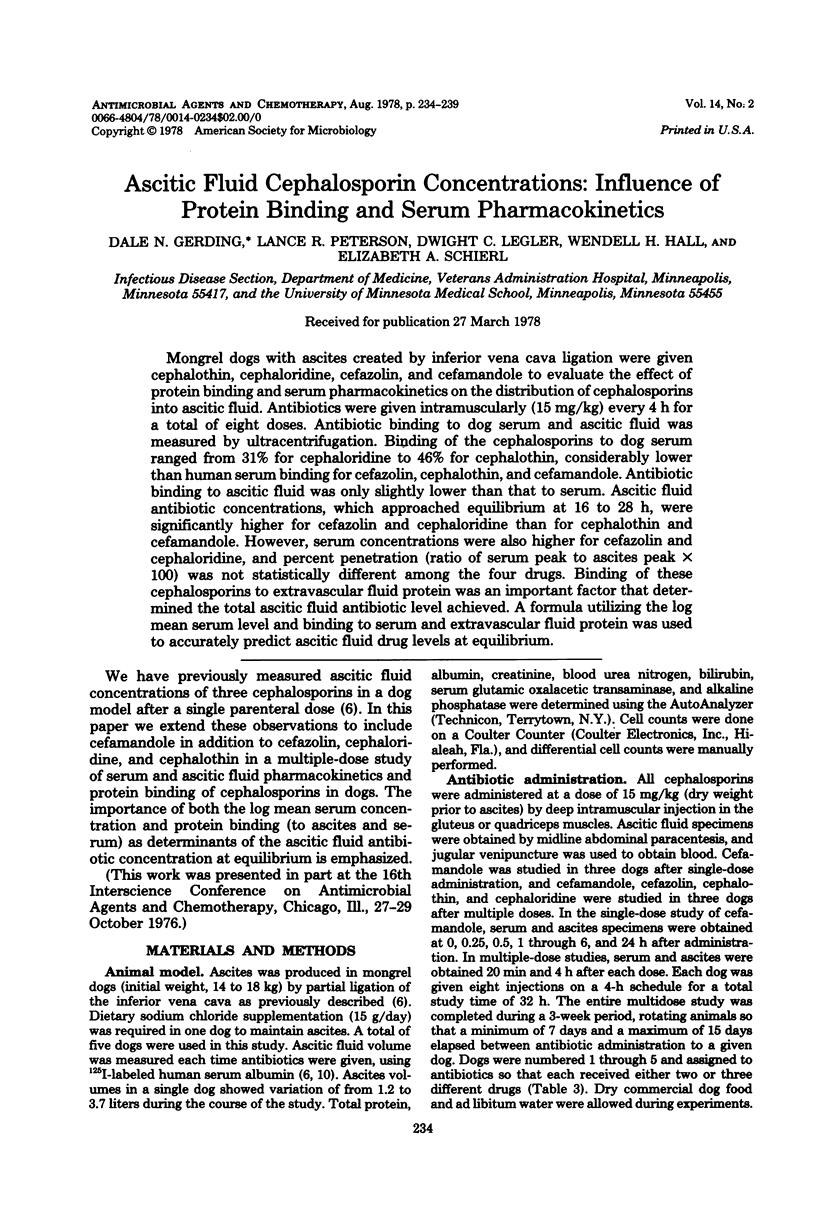
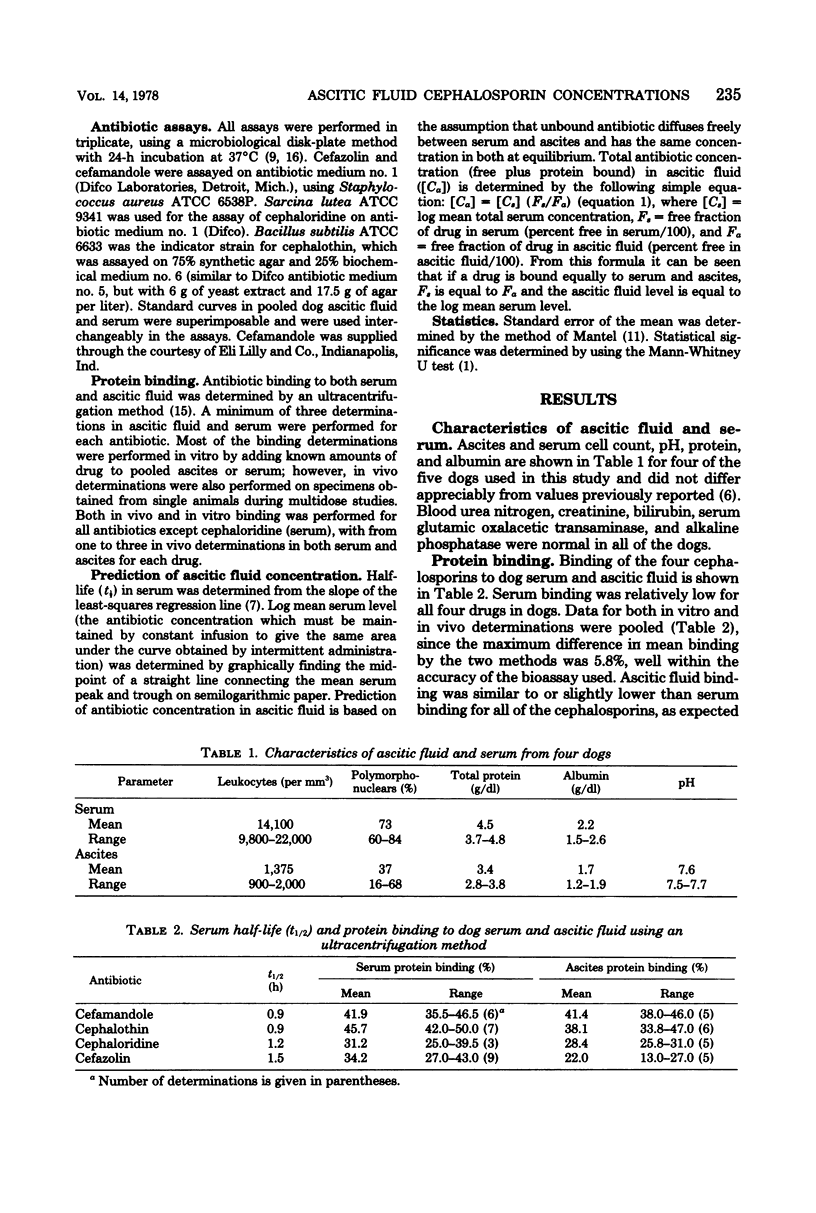
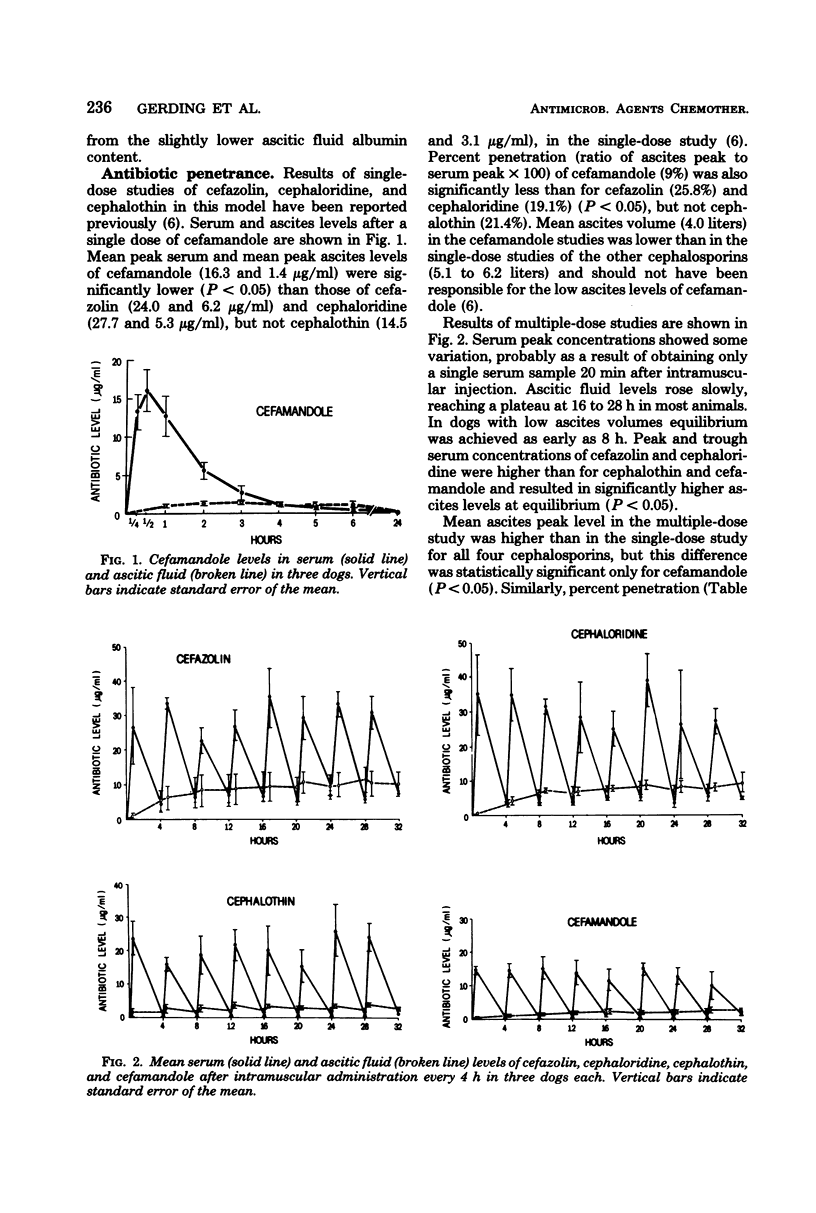
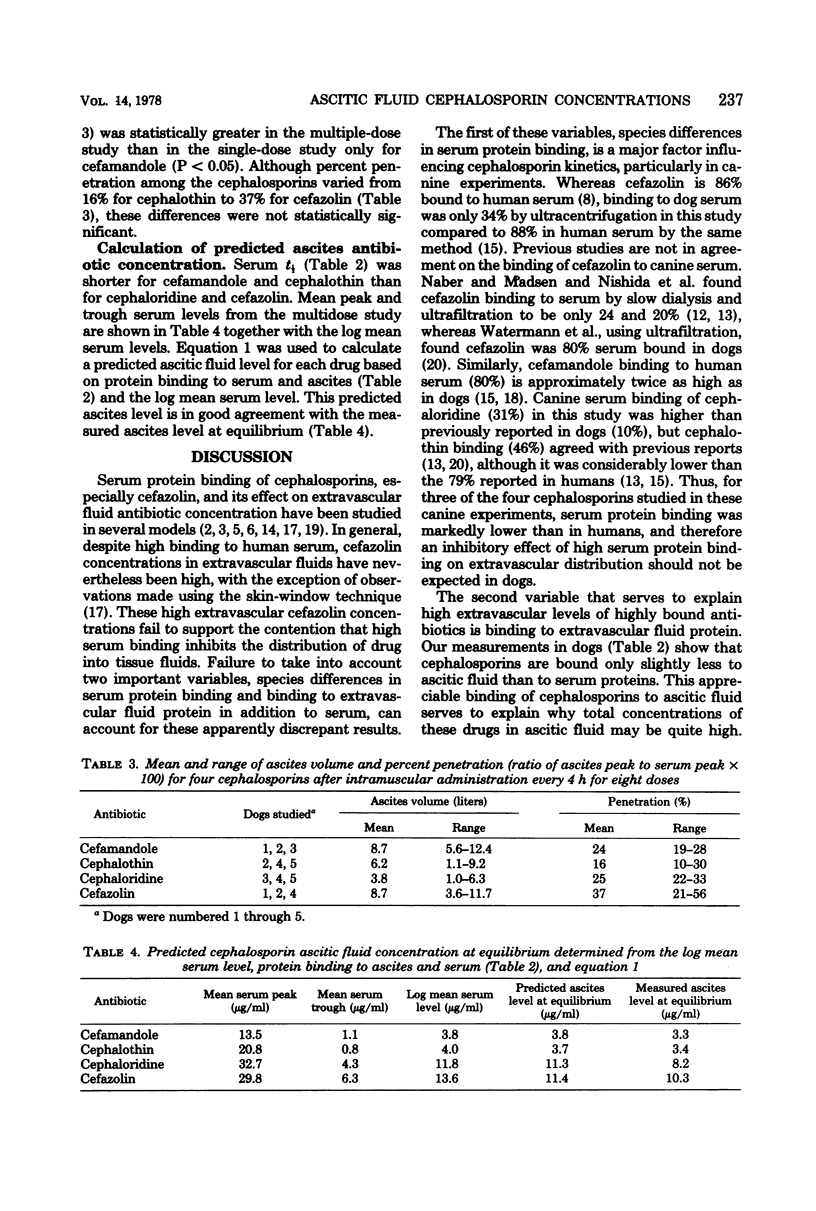
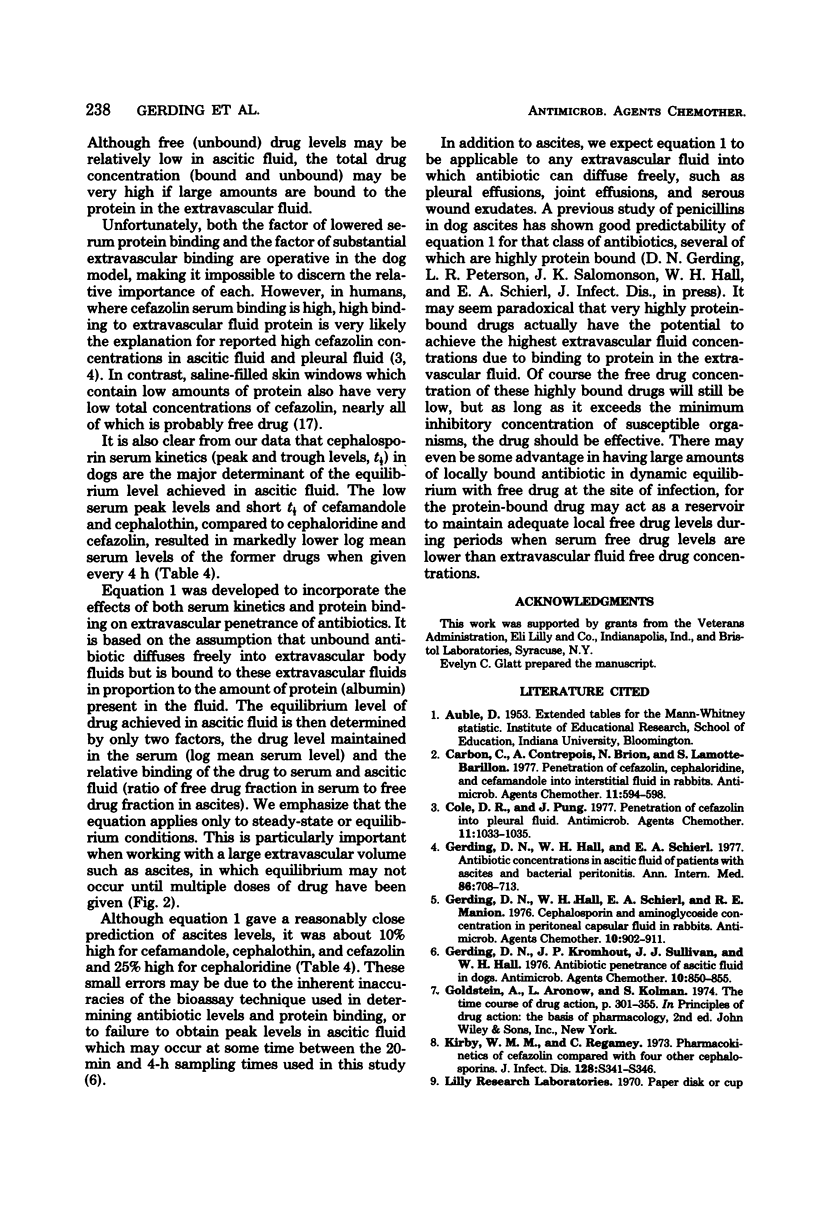
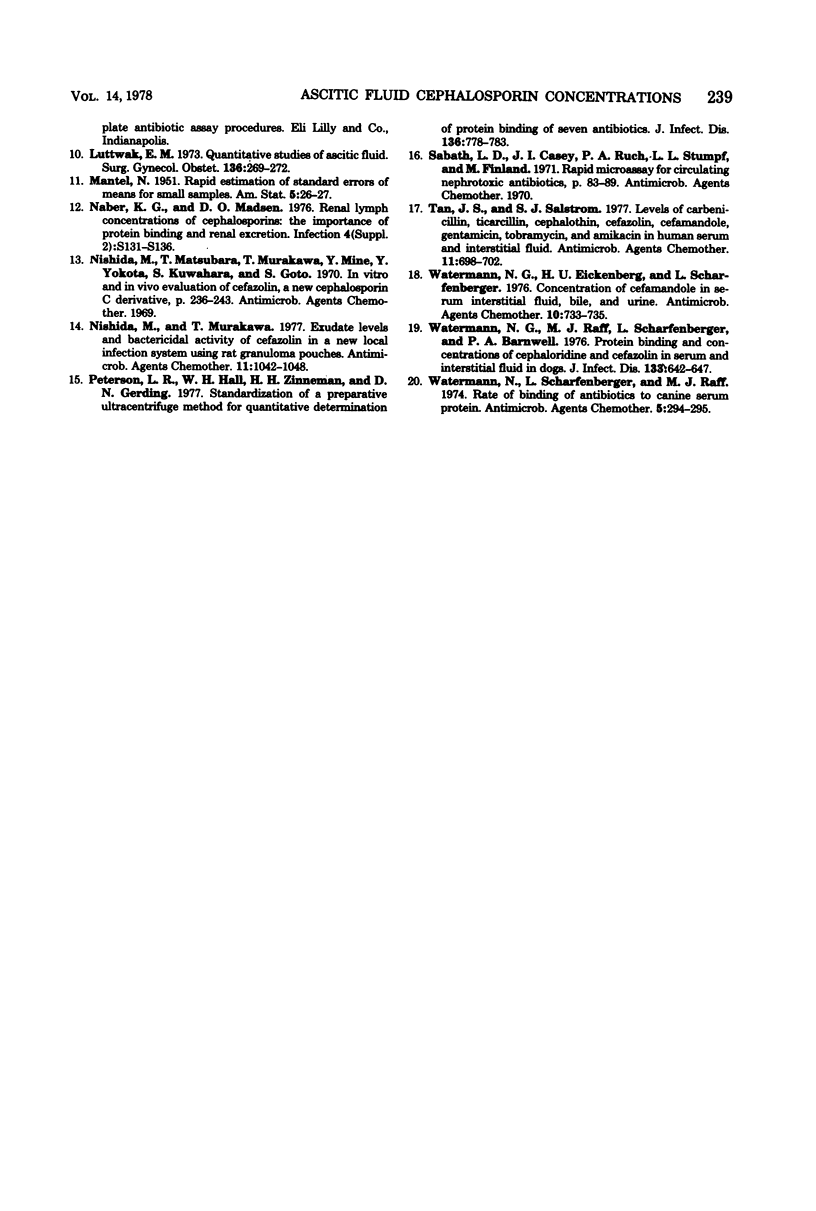
Selected References
These references are in PubMed. This may not be the complete list of references from this article.
- Carbon C., Contrepois A., Brion N., Lamotte-Barrillon S. Penetration of cefazolin, cephaloridine, and cefamandole into interstitial fluid in rabbits. Antimicrob Agents Chemother. 1977 Apr;11(4):594–598. doi: 10.1128/aac.11.4.594. [DOI] [PMC free article] [PubMed] [Google Scholar]
- Cole D. R., Pung J. Penetration of cefazolin into pleural fluid. Antimicrob Agents Chemother. 1977 Jun;11(6):1033–1035. doi: 10.1128/aac.11.6.1033. [DOI] [PMC free article] [PubMed] [Google Scholar]
- Gerding D. N., Hall W. H., Schierl E. A. Antibiotic concentrations in ascitic fluid of patients with ascites and bacterial peritonitis. Ann Intern Med. 1977 Jun;86(6):708–713. doi: 10.7326/0003-4819-86-6-708. [DOI] [PubMed] [Google Scholar]
- Gerding D. N., Hall W. H., Schierl E. A., Manion R. E. Cephalosporin and aminoglycoside concentrations in peritoneal capsular fluid in rabbits. Antimicrob Agents Chemother. 1976 Dec;10(6):902–911. doi: 10.1128/aac.10.6.902. [DOI] [PMC free article] [PubMed] [Google Scholar]
- Gerding D. N., Kromhout J. P., Sullivan J. J., Hall W. H. Antibiotic penetrance of ascitic fluid in dogs. Antimicrob Agents Chemother. 1976 Nov;10(5):850–855. doi: 10.1128/aac.10.5.850. [DOI] [PMC free article] [PubMed] [Google Scholar]
- Kirby W. M., Regamey C. Pharmacokinetics of cefazolin compared with four other cephalosporins. J Infect Dis. 1973 Oct;128(Suppl):S341–S346. doi: 10.1093/infdis/128.supplement_2.s341. [DOI] [PubMed] [Google Scholar]
- Luttwak E. M. Quantitative studies of ascitic fluid. Surg Gynecol Obstet. 1973 Feb;136(2):269–272. [PubMed] [Google Scholar]
- Nishida M., Murakawa T. Exudate levels and bactericidal activity of cefazolin in a new local infection system using rat granuloma pouches. Antimicrob Agents Chemother. 1977 Jun;11(6):1042–1048. doi: 10.1128/aac.11.6.1042. [DOI] [PMC free article] [PubMed] [Google Scholar]
- Peterson L. R., Hall W. H., Zinneman H. H., Gerding D. N. Standardization of a preparative ultracentrifuge method for quantitative determination or protein binding of seven antibiotics. J Infect Dis. 1977 Dec;136(6):778–783. doi: 10.1093/infdis/136.6.778. [DOI] [PubMed] [Google Scholar]
- Tan J. S., Salstrom S. J. Levels of carbenicillin, ticarcillin, cephalothin, cefazolin, cefamandole, gentamicin, tobramycin, and amikacin in human serum and interstitial fluid. Antimicrob Agents Chemother. 1977 Apr;11(4):698–700. doi: 10.1128/aac.11.4.698. [DOI] [PMC free article] [PubMed] [Google Scholar]
- Waterman N. G., Eickenberg H. U., Scharfenberger L. Concentration of cefamandole in serum interstitial fluid, bile, and urine. Antimicrob Agents Chemother. 1976 Oct;10(4):733–735. doi: 10.1128/aac.10.4.733. [DOI] [PMC free article] [PubMed] [Google Scholar]
- Waterman N. G., Raff M. J., Scharfenberger L., Barnwell P. A. Protein binding and concentrations of cephaloridine and cefazolin in serum and interstitial fluid of dogs. J Infect Dis. 1976 Jun;133(6):642–647. doi: 10.1093/infdis/133.6.642. [DOI] [PubMed] [Google Scholar]
- Waterman N., Scharfenberger L., Raff M. J. Rate of binding of antibiotics to canine serum protein. Antimicrob Agents Chemother. 1974 Mar;5(3):294–295. doi: 10.1128/aac.5.3.294. [DOI] [PMC free article] [PubMed] [Google Scholar]


